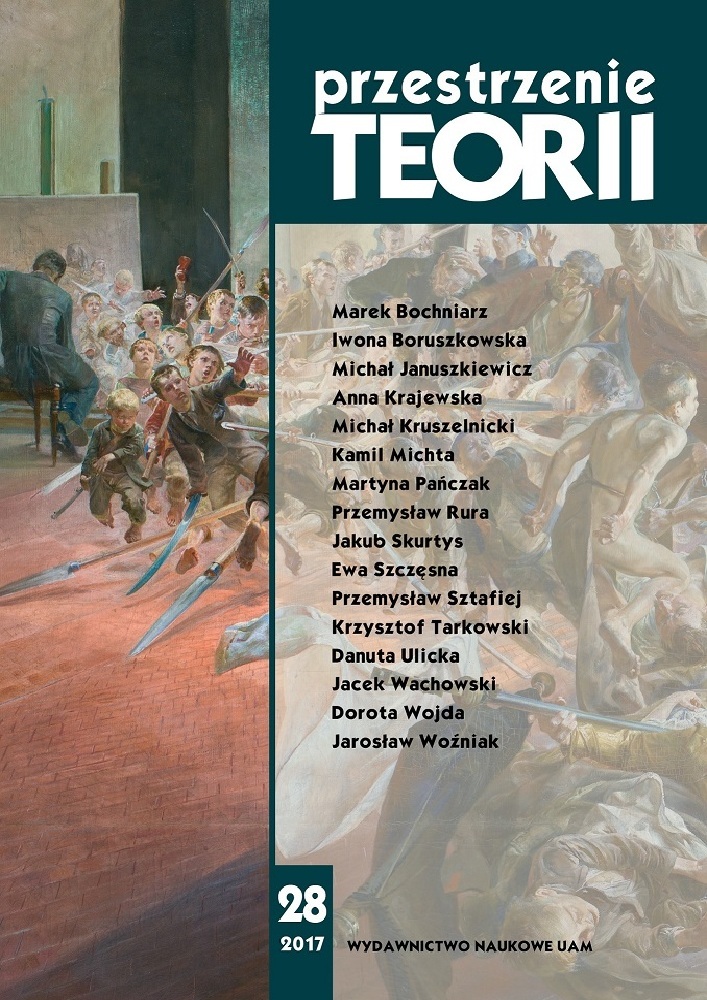Abstract
The article discusses Gombrowicz’s declared “anti-naturalism”, which is often seen as a gesture of negating the non-human world as boring and unworthy of interacting with. Nevertheless, this seemingly radical anthropocentrism does not imply absolute indifference. On the contrary, human anti-naturalness, as emphasized in the work of Gombrowicz, is considered arbitrary, founded on logocentrism and influential interpersonal doctrines. It may therefore be a tragic experience – depriving of a sense of belonging, but also deflating self-confidence, which is grounded in the belief in nature’s otherness. Gombrowicz’s “anti-naturalism”, crucial for the experience of modernity, relates to the problem of definition. The aversion to the non-human is, in fact, the fear of recognising one’s own non-identity; the angst caused by blurring the boundaries that used to arrange the world. It also leads to ignorance, cruelty and a state of “blissful unawareness” on the issues of animal others. In this respect, the writer’s remarks can be very inspiring for ecocritical thought. Gombrowicz once again reminds the reader of the necessity to stop conceiving “Human” as stable, homogenic and self-assured identity and for that reason, collaboration between ecocriticism and posthumanist critical approaches seems unavoidable.References
Agamben G., The Open. Man and Animal, trans. by K. Attell, Stanford 2004.
Barcz A., Człowiek i zwierzę – problem granicy w Dziennikach Gombrowicza, „Artmix” 2011, nr 23(13), <http://archiwum-obieg.u-jazdowski.pl/artmix/16507> [dostęp: 13.10.2016].
Bednarek J., Emancypacyjna obietnica posthumanizmu, „Praktyka Teoretyczna” 2014, nr 4(14), <http://www.praktykateoretyczna.pl/PT_nr14_2014_Polityki_popkultury/07.Bednarek.pdf> [dostęp: 13.10.2016].
Bolecki W., „Jak zachować się wobec krowy?” (Wstęp do bestiarium Witolda Gombrowicza), [w:] W. Gombrowicz, Bestiarium, wstęp, wybór, układ W. Bolecki, Kraków 2004, s. 7–18.
Bolecki W., Poetycki model prozy w dwudziestoleciu międzywojennym. Witkacy, Gombrowicz, Schulz i inni, Kraków 1996.
Bourdieu P., In Other Words. Essays Towards a Reflexive Sociology, trans. by M. Adamson, Stanford 1990.
Braidotti R., Po człowieku, przekład J. Bednarek, A. Kowalczyk, przedmowa do polskiego wydania J. Bednarek, Warszawa 2014.
Braidotti R., Podmioty nomadyczne: ucieleśnienie i różnica seksualna w feminizmie współczesnym, przekład A. Derra, Warszawa 2009.
Buell L., The Future of Environmental Criticism: Environmental Crisis and Literary Imagination, Malden 2005.
Buell L., Writing for an Endangered World. Literature, Culture, and Environment in the U.S. and Beyond, Cambridge 2001.
Derrida J., L’animal que donc je suis, Paris 2006.
Fiedorczuk J., Cyborg w ogrodzie. Wprowadzenie do ekokrytyki, Gdańsk 2015.
Glotfelty Ch., Introduction. Literary Studies in an Age of Environmental Crisis, [w:] The Ecocriticism Reader. Landmarks in Literary Ecology, ed. by Ch. Glotfelty, H. Fromm, Athens 1996, s. XV–XXXVII.
Gombrowicz W., Dziennik 1957–1961, Kraków 1986.
Gombrowicz W., Dziennik 1961–1966, Kraków 1986.
Gombrowicz W., Ferdydurke, Kraków 1986.
Gombrowicz W., Kosmos, Kraków 1986.
Gombrowicz W., Zdarzenia na brygu Banbury, [w:] tegoż, Bakakaj, Kraków 1987, s. 112–151.
Jarzębski J., Gombrowicz i natura, [w:] tegoż, Natura i teatr. 16 tekstów o Gombrowiczu, Kraków 2007.
Latour B., Nigdy nie byliśmy nowocześni. Studium z antropologii symetrycznej, przekład M. Gdula, Warszawa 2011.
Latour B., Polityka natury. Nauki wkraczają do demokracji, przełożyła A. Czarnacka, wstęp M. Gdula, Warszawa 2009.
Manes Ch., Nature and silence, [w:] The Ecocriticism Reader. Landmarks in Literary Ecology, ed. by Ch. Glotfelty, H. Fromm, Athens 1996, s. 15–29.
Markowski M.P., Czarny nurt. Gombrowicz, świat, literatura, Kraków 2004.
Markowski M.P., Polska literatura nowoczesna. Leśmian, Schulz, Witkacy, Kraków 2007.
Morton T., Ecology Without Nature. Rethinking Environmental Aesthetics, Boston 2009.
Mościcki P., Gombrowicz i nieludzkie, „Przegląd Filozoficzno-Literacki” 2004, nr 4, s. 63–85.
Sadzik P., Nie-ludzka wspólnota równych jako próba poszerzenia granic etyki, „Praktyka Teoretyczna” 2014, nr 4(14), <http://www.praktykateoretyczna.pl/PT_nr14_2014_
Polityki_popkultury/11.Sadzik.pdf> [dostęp: 13.10.2016].
Special forum on ecocriticism and theory, „Interdisciplinary Studies in Literature and the Environment” 2010, 17(4).
Uniwersalny słownik języka polskiego PWN, P–Ś, red. S. Dubisz, Warszawa 2006.
Wolfe C., What is Posthumanism?, Minneapolis 2010.
License
Authors
Authors of texts accepted for publication in Przestrzenie Teorii are required to complete, sign and return to the editor's office the Agreement for granting a royalty-free license to works with a commitment to grant a CC sub-license.
Under the agreement, the authors of texts published in Przestrzenie Teorii grant the Adam Mickiewicz University in Poznań a non-exclusive, royalty-free license and authorize the use of Attribution-NonCommercial-NoDerivatives 4.0 International (CC BY-NC-ND 4.0) Creative Commons sub-license.
The authors retain the right to continue the free disposal of the work.
Users
Interested Internet users are entitled to use works published in Przestrzenie Teorii since 2015, for non-commercial purposes only, under the following conditions:
- attribution - obligation to provide, together with the distributed work, information about the authorship, title, source (link to the original work, DOI) and the license itself.
- no derivatives - the work must be preserved in its original form, without the author's consent it is not possible to distribute the modified work, such as translations, publications, etc.
Copyrights are reserved for all texts published before 2015.
Miscellaneous
Adam Mickiewicz University in Poznań retains the right to magazines as a whole (layout, graphic form, title, cover design, logo etc.).
